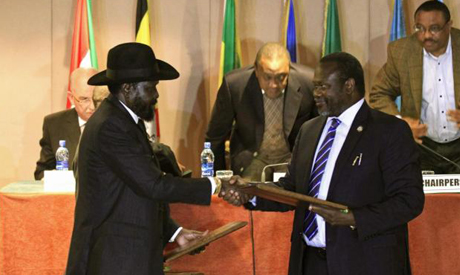
File Photo: South Sudan's President Salva Kiir (front L) and South Sudan's rebel commander Riek Machar exchange documents after signing a ceasefire agreement during the Inter Governmental Authority on Development (IGAD) Summit on the case of South Sudan in Ethiopia's capital Addis Ababa (Photo: Reuters)
South Sudan's warring government and rebel forces signed Monday a committment to settle key security sections of a peace deal, despite having broken the pact multiple times.
The agreement is hoped to kickstart stalled talks for key military sections of an August 26 deal, including the demilitarisation of the capital Juba, the positions of troops on both sides and steps towards the creation of a unified army.
"This signing by the opposition is a breakthrough... peace is now a reality," said Peter Bashir Mandi, the government's deputy foreign minister, after the signing in neighbouring Ethiopia.
The army and rebels have repeatedly traded blame, accusing each other of breaking the internationally-brokered ceasefire, the eighth such agreement.
Fighting continues.
"This is a commitment and the guns are now going to be silent," Mandi added. "The real monitoring of the ceasefire will happen. All the institutions established by the peace agreement are going to be put in place."
Civil war began in December 2013 when President Salva Kiir accused his former deputy Riek Machar of planning a coup, setting off a cycle of retaliatory killings across the country that has split the poverty-stricken, landlocked country along ethnic lines.
Tens of thousands of people have been killed, and UN-backed experts have warned of the "concrete risk of famine" before the end of the year, if fighting continues and aid does not reach the hardest hit areas.
The demilitarisation of government-held Juba to allow the return of rebel chief Riek Machar and his rebel entourage is a key provision of the peace agreement.
But the rivals have disagreed on the composition of those troops allowed to stay in the city.
"What is important is unifying the forces, starting with the presidential guard and the military posted in Juba," said rebel negotiator Taban Deng.
"We agree that we shall continue discussing, and to implement the agreement."
Both sides are accused of having perpetrated ethnic massacres, recruited and killed children and carried out widespread rape, torture and forced displacement of populations to "cleanse" areas of their opponents.
Some 3.9 million people are in crisis -- a third of the country's population -- a massive 80 percent rise compared to the same period last year, the UN said.
Short link: